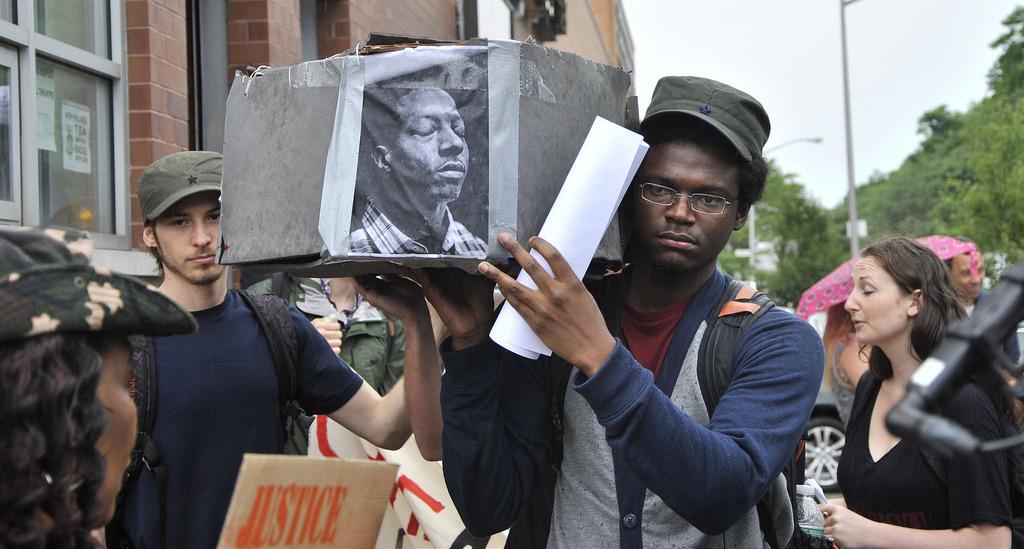Queens Prosecutor: Kalief Browder’s Suicide Wasn’t About Rikers
City Council Member Rory Lancman, who was debating Assistant District Attorney James Quinn over the future of Rikers Island, blasted Quinn’s comments on Browder, who spent three years incarcerated without a trial.

In a heated debate last week over whether New York City should close Rikers Island, Queens Assistant District Attorney James Quinn sparred with City Council Member Rory Lancman, chairperson of the council’s Committee on the Justice System, who could become Quinn’s boss in next year’s election for Queens DA. The debate highlighted the tensions between Lancman, a self-professed reformer, and an office that has been notably slow to reform.
Led by an 85-year-old incumbent who has been in power for nearly three decades, the Queens district attorney’s office is one of only two in the city (Staten Island’s is the other) that publicly opposes the slow-moving closure of Rikers. Some advocates have also questioned the plan, which aims to reduce the jail population while increasing the number of jails.
At the debate, Quinn defended his office’s stance, arguing that the city’s jail population should not be cut to what he considers an arbitrary number to fulfill demands for the jail’s closure. Quinn said he stood by his past comment that people detained at Rikers “belong in Rikers.”
Lancman disagreed. “With all due respect,” he said, “there are many policies from the Queens district attorney’s office that contribute to incarcerating poor Black and Latino people.” He pointed out that, unlike other city DA’s offices, the Queens DA has not vowed to reduce its prosecution of low-level offenses. “You cannot avoid the fact that the policies of the Queens district attorney’s office put more people in jail than ought to be.”
Lancman also criticized the Queens DA’s office for its failure to approve a conviction review unit, as the other four boroughs have done, and for its controversial plea deal practices. Under that system, Lancman argued, defendants charged with felonies are coerced into waiving their speedy trial rights.
Quinn didn’t deny that the intent of this practice is to have defendants waive their rights to a speedy trial, but justified the practice by arguing it is highly inconvenient for Queens residents to be called for a grand jury. “If they don’t waive, we have to bring people like this”—he pointed to the audience—“from all across Queens County to go into the grand jury and take a day off and testify against that defendant in order to indict him.”
But perhaps the most contentious moment of the night came when Quinn lashed out at the anti-mass incarceration movement, taking aim at the national outcry that followed the death of Kalief Browder, a Bronx teenager who spent three years in jail without trial for an alleged theft of a backpack.
While in Rikers, Browder endured beatings by guards and inmates and roughly two years of solitary confinement. In solitary, Browder attempted suicide once. After being released, Browder told The New Yorker, “I’m not all right. I’m messed up.” Six months after getting out, he tried again. Two years later, the 22-year-old took his life.
Quinn sought to minimize the role Browder’s time in jail played in his death. “Kalief Browder did not commit suicide at Rikers Island,” Quinn said, his finger wagging at the crowd. “He committed suicide two years after he got out of Rikers Island. That is a fact. Everybody knows it.”
Quinn was loudly applauded for these comments during the debate, which took place in Kew Gardens Hills, a majority white neighborhood in Queens.
In his retelling of Browder’s case, Quinn also asserted that Browder had been held on a high bail because he “went out and committed another robbery,” violating his probation for a previous incident. In fact, Browder spent three years in jail denying that he committed that robbery, and he was released in year 2013 when the charges were dropped.
In response to Quinn’s applauded comments, Lancman hit back. “I do not know what satisfaction you get by the potential fact that he killed himself two years after he was in Rikers Island,” Lancman said. “And not in Rikers Island itself.” He subsequently issued a statement via Twitter. “This moment from my debate with the Queens D.A.’s office floored me – I still haven’t gotten over it,” Lancman wrote. “No matter what you believe about Rikers Island, human decency demands that no one applaud when we discuss Kalief Browder committing suicide.”
Akeem Browder, Kalief’s brother and president of the Kalief Browder Foundation, called Quinn’s comments “disrespectful” and argued that Quinn was lying about his brother’s history in an attempt to defend Rikers. During the debate, Quinn asserted that Kalief Browder had mental health issues before his time at Rikers, a claim that Browder claimed was baseless and disrespectful. “This is 100 percent wrong,” Browder said in a phone call. “Where did he get his facts or information from?”
The Queens district attorney’s office did not respond by press time to The Appeal’s queries about Quinn’s explanation and evidence for these comments.
Findayawah Gbollie, a Legal Aid Society attorney practicing in Queens, called the comments “shameful.” “He said that he had committed another robbery, not even that he was accused of committing another robbery,” said Gbollie. “They don’t see a difference between committing a crime and being accused. So what’s even the point of having a jury, having a judicial process, if the mere accusation is equal to a crime itself?”
